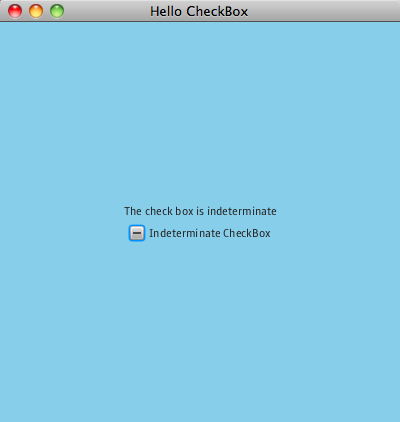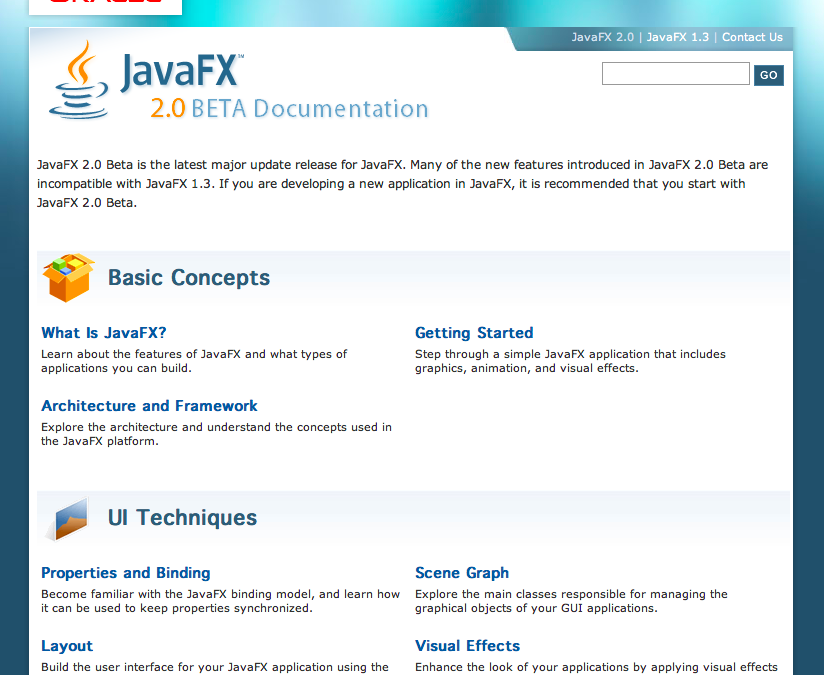FX Experience Has Gone Read-Only
I've been maintaining FX Experience for a really long time now, and I love hearing from people who enjoy my weekly links roundup. One thing I've noticed recently is that maintaining two sites (FX Experience and JonathanGiles.net) takes more time than ideal, and splits the audience up. Therefore, FX Experience will become read-only for new blog posts, but weekly posts will continue to be published on JonathanGiles.net. If you follow @FXExperience on Twitter, I suggest you also follow @JonathanGiles. This is not the end - just a consolidation of my online presence to make my life a little easier!
tl;dr: Follow me on Twitter and check for the latest news on JonathanGiles.net.
by Richard Bair | Jun 14, 2011 | General
I was just going through the bug database and realized that, to my knowledge, we’ve never actually told people what the code names are for our releases, and that that is pretty useful to know when filing bugs. Ever since JavaFX 1.0 we’ve used street or area names from San Francisco as our code names. Honestly I can’t remember the 1.0 code name anymore. 1.2 was called “Marina”, 1.3 was “SoMa” (South of Market).
This release, 2.0, is called “Presidio”, and the next major release is called “Lombard”. So when you see that your issue is targeted at one of these, you know what we’re taking about! If it remains “untargeted”, then it has gone into the pool from which we draw features for future releases, but may not be targeted to a specific release until later in the planning cycle.

by Richard Bair | Jun 3, 2011 | Controls, Tips n' Tricks
The CheckBox in JavaFX can be configured for two states (selected, or not) or three states (selected, unselected, or indeterminate). This indeterminate state is often useful when a checkbox is being used in a TreeView, for example. You might be implementing a tree view showing which features are installed, and need to toggle to an indeterminate state for the branch of some of the children are selected, and some are not.

(more…)

by Richard Bair | May 27, 2011 | Links
Just a quick post to point a link to the JavaFX Documentation page. The documentation team has been working really close with the engineering team and done a wonderful job in putting together these docs. For example, there is some great documentation for Properties & Binding, Working with Layouts, and Using UI Controls.
Jump over there and give the documentation a good read while building applications in JavaFX!

by Richard Bair | May 27, 2011 | General
For months and months we’ve been focused solely on the mechanics of building a platform — API design, writing tests, fixing bugs, use cases, features, documentation etc — and with the release of the beta the #1 question on everyone’s mind is, “Is JavaFX 2.0 cross platform?!”. That the beta is initially a windows-only beta has apparently stirred up a fair amount of concern. Shockingly, some people have even asked whether we ever intend to be cross platform. I can say definitively “Yes, of course!”. It would be quite illogical for any platform released by the Java team to not be cross platform. And even more so for the Java team to release a platform which had no intention of being cross platform while also purporting that the said platform was to be the next generation Java rich client platform.
We absolutely will be targeting a whole host of different platforms, not even just the big three (Mac, Linux, Windows). The value of the Java platform is in the fact that you can write across multiple operating systems and devices.
Now, somewhat like Apple, Oracle doesn’t tend to make premature announcements. I cannot at this time comment on when support for different platforms will be available, but hope to comment when such announcements have been made through the official channels. I know that this form of communication strategy leaves people to their own imagination which, as often as not, seems to be rather pessimistic in nature :-). So, to help provide some guidance here, I’d just like to say:
JavaFX will be cross platform.
by Richard Bair | Nov 12, 2010 | News
As you’ve probably already heard, a big announcement came out today from Apple and Oracle announcing that Apple is contributing to the OpenJDK! This is great news for us as IBM and now Apple have joined with Oracle on a single implementation of Java. Those who have been in the Java landscape for a while know what a big deal this is (and has been a dream of mine since I first came to Sun). I think the agreement really clarifies a few things:
Apple also confirmed that Java SE 6 will continue to be available from Apple for Mac OS X Snow Leopard® and the upcoming release of Mac OS X Lion. Java SE 7 and future versions of Java for Mac OS X will be available from Oracle.
Anyway, I hope to blog some more in the future about what our plans are around this and how it will be going forward. I’m fairly giddy about it, a bit like getting christmas early. Hooray!
Edit:
The news already made it to ArsTechnica: http://arstechnica.com/apple/news/2010/11/apples-openjdk-project-to-bring-java-se-7-to-the-mac.ars
And Information Week http://www.informationweek.com/news/software/open_source/showArticle.jhtml?articleID=228200849&subSection=News





